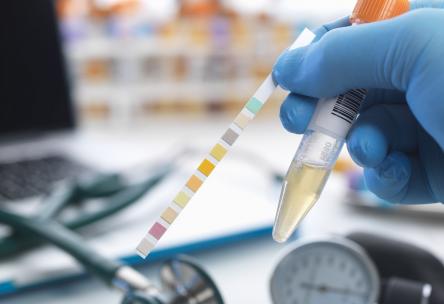Six important factors to check for

It’s not the world’s most fun topic, but it’s a vital one, medically speaking: urine. “The appearance of urine can tell you a lot about the state of your health,” says UCLA professor of urology Allan Pantuck, M.D. The testing of urine “goes back thousands of years, to Hippocrates. Urine was looked at as a noninvasive window into what was happening on the inside of the body, before we had blood tests or X-rays.”
Today, through urinalysis, medical experts inspect urine for chemicals and enzymes that are indicators of other health issues, and a simple glance at your own urine can be a good starter diagnostic—particularly for seniors. A discoloration of urine in younger people “may be just an infection or trauma,” Dr. Pantuck says. “As you get older, the risk of cancers of the urinary tract such as the kidney or bladder goes up.” If you’re not already in the habit, take a quick glance before you flush. As you look, here are six key questions to keep in mind:
Question #1: Is it light yellow?
The urine from a healthy body should be light yellow or light amber, Dr. Pantuck says. That color comes from a pigment in urine called “urochrome,” a breakdown product of hemoglobin, which carries oxygen throughout the body. Darkness is an indication of how dilute or concentrated the urine is. If you’re not producing enough fluid, your urine will be overly concentrated and appear darker. In that case, you need to hydrate more frequently. A general guideline is to drink eight 8-ounce glasses per day (which adds up to about 2 liters, or half a gallon, total), but depending upon things such as weather temperature or exercise intensity, more may be needed.
Question #2: Am I at risk of kidney stones?
If you’ve had kidney stones before or have been told you’re at high risk (due to factors such as family prevalence or obesity), dark urine is especially troubling. The more concentrated your urine, the greater chance you have of developing a new stone, Dr. Pantuck advises—so refill that water bottle, particularly in warm weather.
Question #3: Is it brown?
If your urine is brown, like the shade of Coca-Cola for example, that could indicate liver problems or muscle damage, Dr. Pantuck says. A breakdown of bilirubin, related to liver damage, can create the brownish color, and a breakdown of muscle creates myoglobin, which is also a brown shade.
Question #4: Is it red?
When it comes to urine color, one major red flag is, well, red. That’s an indicator of blood in the urine. And that can mean an infection of the urinary tract or kidneys, or a bladder or kidney tumor. However, some foods, like beets, and some medications, like those for tuberculosis, can turn the urine a reddish color (some dyes in foods can turn urine blue, as well). If your urine is red, and you can rule out food- or medicine-related discolorations, check in with your doctor right away. “Any blood in the urine should be checked,” Dr. Pantuck warns, “even if it’s intermittent—it may still be an issue. If you can’t explain it through common sense, explain it through testing.” Make an appointment with your health care professional.
Question #5: Is it clear or cloudy?
In addition to color, be aware of the clarity of your urine. Cloudiness or debris can also be a sign of infection. And if urine is foamy or fizzy, that may signal the presence of protein, which can indicate kidney issues, according to the National Kidney Foundation.
Question #6: Is it serious?
If your urine presents as cloudy or a different color one day, but you have no other symptoms, it may only be a sign that you need to drink more water. Monitor it for another day or two, Dr. Pantuck says. (The exception is red color—in that case, don’t delay.) If you have discolored or cloudy urine for more than a couple of days, make an appointment with your primary care provider. Your doctor can do a few simple tests and rule out some diagnoses, then advise as to whether a specialist is needed.
If you have urinary pain, burning, itching, frequency, or urgency (need to go, now!) issues, get to your provider right away, or visit an urgent care clinic for more immediate treatment.


